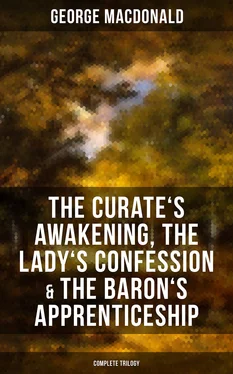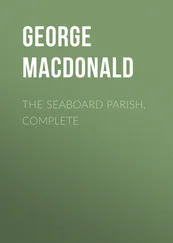Still no daybreak—and now the miracles had grown troublesome! Could Mr. Polwarth honestly say that he found no difficulty in believing things so altogether out of the common order of events, and so buried in the darkness and dust of antiquity that investigation was impossible?
Mr. Polwarth could not say that he had found no such difficulty.
"Then why should the weight of the story," said Wingfold, "the weight of its proof, I mean, to minds like ours, coming so long after, and by their education incapacitated for believing in such things, in a time when the law of everything is searched into—-"
"And as yet very likely as far from understood as ever," interposed but not interrupted Polwarth.
"Why should the weight of its proof, I ask, be laid upon such improbable things as miracles? That they are necessarily improbable, I presume you will admit."
"Having premised that I believe every one recorded," said Polwarth, "I heartily admit their improbability. But the WEIGHT of proof is not, and never was laid upon them. Our Lord did not make much of them, and did them far more for the individual concerned than for the sake of the beholders. I will not however talk to you about them now. I will merely say that it is not through the miracles you will find the Lord, though, having found him, you will find him there also. The question for you is not, Are the miracles true? but, Was Jesus true? Again I say, you must find him—the man himself. When you have found him, I may perhaps retort upon you the question—Can you believe such improbable things as the miracles, Mr. Wingfold?"
The little man showed pretty plainly by the set of his lips that he meant to say no more, and again Wingfold had, with considerable dissatisfaction and no answer, to go back to his New Testament.
CHAPTER XXXI.
THE CURATE MAKES A DISCOVERY.
Table of Contents
At length, one day, as he was working with a harmony, comparing certain passages between themselves, and as variedly given in the gospels, he fell into a half-thinking, half-dreaming mood, in which his eyes, for some time unconsciously, rested on the verse, "Ye will not come unto me that ye might have life:" it mingled itself with his brooding, and by and by, though yet he was brooding rather than meditating, the form of Jesus had gathered, in the stillness of his mental quiescence, so much of reality that at length he found himself thinking of him as of a true-hearted man, mightily in earnest to help his fellows, who could not get them to mind what he told them.
"Ah!" said the curate to himself, "if I had but seen him, would not I have minded him!—would I not have haunted his steps, with question upon question, until I got at the truth!"
Again the more definite thought vanished in the seething chaos of reverie, which dured unbroken for a time,—until again suddenly rose from memory to consciousness and attention the words: "Why call ye me Lord, Lord, and do not the things which I say?"
"Good God!" he exclaimed, "here am I bothering over words, and questioning about this and that, as if I were testing his fitness for a post I had to offer him, and he all the time claiming my obedience! I cannot even, on the spur of the moment at least, tell one thing he wants me to do; and as to doing anything because he told me—not once did I ever! But then how am I to obey him until I am sure of his right to command? I just want to know whether I am to call him Lord or not. No, that won't do either, for he says, Why even of yourselves judge ye not what is right? And do I not know—have I ever even doubted that what he said we ought to do was the right thing to do? Yet here have I, all these years, been calling myself a Christian, ministering, forsooth, in the temple of Christ, as if he were a heathen divinity, who cared for songs and prayers and sacrifices, and cannot honestly say I ever once in my life did a thing because he said so, although the record is full of his earnest, even pleading words! I have NOT been an honest man, and how should a dishonest man be a judge over that man who said he was the Christ of God? Would it be any wonder if the things he uttered should be too high and noble to be by such a man recognized as truth?"
With this, yet another saying dawned upon, him: IF ANY MAN WILL DO HIS WILL, HE SHALL KNOW OF THE DOCTRINE, WHETHER IT BE OF GOD, OR WHETHER I SPEAK OF MYSELF.
He went into his closet and shut to the door—came out again, and went straight to visit a certain grievous old woman.
The next open result was, that, on the following Sunday, a man went up into the pulpit who, for the first time in his life, believed he had something to say to his fellow-sinners. It was not now the sacred spoil of the best of gleaning or catering that he bore thither with him, but the message given him by a light in his own inward parts, discovering therein the darkness and the wrong.
He opened no sermon-case, nor read words from any book, save, with trembling voice, these:
"WHY CALL YE ME LORD, LORD, AND DO NOT THE THINGS WHICH I SAY?"
I pause for a moment in my narrative to request the sympathy of such readers as may be capable of affording it, for a man whose honesty makes him appear egotistic. When a man, finding himself in a false position, is yet anxious to do the duties of that position until such time as, if he should not in the meantime have verified it, and become able to fill it with honesty, he may honourably leave it, I think he may well be pardoned if, of inward necessity, he should refer to himself in a place where such reference may be either the greatest impiety, or the outcome of the truest devotion. In him it was neither: it was honesty—and absorption in the startled gaze of a love that believed it had caught a glimmer of the passing garment of the Truth. Thus strengthened—might I not say inspired? for what is the love of truth and the joy therein, if not a breathing into the soul of the breath of life from the God of truth?—he looked round upon his congregation as he had never dared until now—saw face after face, and knew it—saw amongst the rest that of Helen Lingard, so sadly yet not pitifully altered, with a doubt if it could be she; trembled a little with a new excitement, which one less modest or less wise might have taken—how foolishly!—instead of the truth perceived, for the inspiration of the spirit; and, sternly suppressing the emotion, said,
"My hearers, I come before you this morning to utter the first word of truth it has ever been given to ME to utter."
His hearers stared both mentally and corporeally.
"Is he going to deny the Bible?" said some.
—"It will be the last," said others, "if the rector hear in time how you have been disgracing yourself and profaning his pulpit."
"And," the curate went on, "it would be as a fire in my bones did I attempt to keep it back.
"In my room, three days ago, I was reading the strange story of the man who appeared in Palestine saying that he was the Son of God, and came upon those words of his which I have now read in your hearing. At their sound the accuser, Conscience, awoke in my bosom, and asked, 'Doest thou the things he saith to thee?' And I thought with myself,—'Have I this day done anything he says to me?—when did I do anything I had heard of him? Did I ever'—to this it came at last—'Did I ever, in all my life, do one thing because he said to me DO THIS?' And the answer was NO, NEVER. Yet there I was, not only calling myself a Christian, but on the strength of my Christianity, it was to be presumed, living amongst you, and received by you, as your helper on the way to the heavenly kingdom—a living falsehood, walking and talking amongst you!"
"What a wretch!" said one man to himself, who made a large part of his living by the sale of under-garments whose every stitch was an untacking of the body from the soul of a seamstress. "Bah!" said some. "A hypocrite, by his own confession!" said others. "Exceedingly improper!" said Mrs. Ramshorn. "Unheard-of and most unclerical behaviour! And actually to confess such paganism!" For Helen, she waked up a little, began to listen, and wondered what he had been saying that a wind seemed to have blown rustling among the heads of the congregation.
Читать дальше












